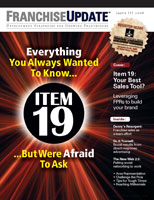Keeping Financial Performance Claims Legal
Done right, FPRs can be an important selling tool
Let there be no misunderstanding: financial performance representations (formerly referred to as "earnings claims" and referred to below as "FPRs") are powerful tools in the franchise sales process.
So, one might ask, why doesn't every franchisor take advantage of them and equip its sales force with the appropriate information that would allow the sales personnel to make FPRs? The answer to this question is not simple. And to understand both the parameters on using FPRs and the reason for caution, one must take a step back and look at the applicable regulatory scheme.
In the early days of commercial franchising, around 1970, the franchise sales environment might be likened to the Wild West. Franchise sales personnel would make unsupported statements about actual and potential profitability, with the result being a significant number of franchise frauds. In what some might view as an overreaction, state governments created franchise disclosure and registration laws that emasculated franchisors' ability to use FPRs.
Over the next decade or so, the restrictions on the use of FPRs were loosened somewhat, but it was not until the late 1980s that a committee of the North American Securities Administrators Association, whose members are state franchise regulators, opened the barn door for the franchise sales forces. At that point, the operating rule—and the rule is essentially the same today—became that franchisors can make FPRs as long as 1) there is a reasonable basis for them and 2) they make available the information to substantiate those representations if so requested by franchise prospects.
While industry observers generally acknowledge that the number of franchisors making FPRs has steadily increased over the years, those franchisors still stand in the clear minority. In certain industries (particularly lodging), FPRs are very common, but it has been suggested that generally, less than one third of franchisors provide the financial information needed for prospective franchisees to make informed investment decisions—up from perhaps 20 percent in the late 1980s.
Several factors contribute to this reluctance to disclose. Historically, many franchisors did not have access to information that would allow them to prepare a reliable FPR. With the advent of technology, this is no longer a viable excuse in most situations. In some cases where, for example, franchisor revenues are not based on franchise sales, but instead on sales of products or there are fixed monthly royalty payments, franchisors do not need to collect information regarding franchise sales.
Some franchisors do not feel comfortable about relying on information furnished by franchisees. It is a common joke that many franchisees have multiple sets of books: one for the franchisor, one for the revenue officials, and one for themselves that is truthful. But even if this is true, all of these would tend to understate profitability. Where systems have both franchised and non-franchised units, at a minimum the franchisor should consider providing FPRs with respect to its own operations.
What often goes overlooked is that a very large portion of the franchisor community is either in start-up mode or just one step beyond. In these situations, cautionists ask: How can a franchisor provide a reliable FPR? Of course, while great care is necessary to explain to prospects in this situation that the sampling of units on which the FPR is based may be small (as little as one), some information, I would argue, is certainly better than none. "None" results in forcing the franchisee prospect to dig up numbers from industry statistics or from a non-disciplined inquiry of the limited number (perhaps none) of existing franchisees, who may put their own spins on their performance. Certainly this information will not be more reliable than a thoughtful FPR constructed by the franchisor.
The litigation bogey
Some franchisors do not want to make FPRs simply because of fear of litigation. Although I have seen no statistics on how often franchisors get sued as a result of making earnings claims, there are remarkably few reported cases on the subject. This suggests that these cases are not common at all.
I suspect that in the real world, there are several explanations for the paucity of FPR litigation—and one of these is not that franchisors do not make illegal FPRs. I suspect, to the contrary, that franchisors make unlawful FPRs all the time: the temptation is simply too great.
The first reason for so little reported litigation is that, for franchisees, these cases are very difficult to win. Proper franchisor documents stack the deck against the franchisee. They contain waivers and disclaimers, that, absent a state statute prohibiting the same, give franchisors get-out-of-jail-free cards. Even though many franchisees are not sophisticated, courts traditionally treat many of them as being businesspersons who do not warrant judicial protection to the same degree as consumers. Thus, the courts often honor the waivers and disclaimers, even when there is convincing evidence that the FPRs were made and were inaccurate.
Second, to succeed on an FPR claim, the franchisee must essentially prove fraud, although the proof standards are somewhat lower in states with franchise sales laws. Fraud claims, as most beginning law students learn, are not viewed favorably by courts, and are composed of multiple elements, all of which must be proved before a franchisee will succeed on his or her claim. The franchisee must prove:
- the fraudulent statement was made;
- the franchisor knew it to be false or made the statements without regard to its truthfulness;
- the franchisee relied upon the false statement;
- the reliance was reasonable;
- the reliance was the proximate cause of the franchisee's damages; and
- the amount of damages.
Most franchisees fail when trying to pursue fraud claims because they cannot successfully prove that their reliance was reasonable in light of the typical language contained in the Franchise Agreement, the Franchise Disclosure Document (FDD), and often a Franchisee Questionnaire stating that the franchisee has not received improper FPRs or that the franchisee has been instructed not to rely upon earnings information not contained in the FDD.
One further explanation for so little litigation over FPRs is that the wise franchisors settle bad suits. The franchisor community has the luxury of selecting whether to litigate until Armageddon those suits in which truth and justice are on its side, or throwing money toward settlement of those suits that resulted from a franchise salesperson on a frolic who detoured from his authorized responsibilities.
Franchisors are typically labeled as entrepreneurs. Thus, it is surprising that more have not embraced using FPRs in the earnings claim process, thereby assuming the associated risks. Is this because the franchisor fears that franchise prospects will not like what the FPR would show? That possibility suggests that the franchisor might reconsider its decision to franchise in the first place.
Rupert Barkoff is a partner in the Atlanta office of Kilpatrick Stockton LLP, where he chairs the firm's franchise practice. He is a former Chair of the American Bar Association's Forum on Franchising, and Co-Editor-In-Chief of Fundamentals of Franchising.
Share this Feature
Recommended Reading:
FRANCHISE TOPICS
- Multi-Unit Franchising
- Get Started in Franchising
- Franchise Growth
- Franchise Operations
- Open New Units
- Franchise Leadership
- Franchise Marketing
- Technology
- Franchise Law
- Franchise Awards
- Franchise Rankings
- Franchise Trends
- Franchise Development
- Featured Franchise Stories
FEATURED IN

Franchise Update Magazine: Issue 3, 2008








 The franchise listed above are not related to or endorsed by Franchise Update or Franchise Update Media Group. We are not engaged in, supporting, or endorsing any specific franchise, business opportunity, company or individual. No statement in this site is to be construed as a recommendation. We encourage prospective franchise buyers to perform extensive due diligence when considering a franchise opportunity.
The franchise listed above are not related to or endorsed by Franchise Update or Franchise Update Media Group. We are not engaged in, supporting, or endorsing any specific franchise, business opportunity, company or individual. No statement in this site is to be construed as a recommendation. We encourage prospective franchise buyers to perform extensive due diligence when considering a franchise opportunity.